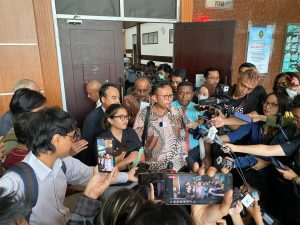Earlier this week, an Indonesian court began a trial against two prominent human rights activists accused of defaming a powerful member of President Joko “Jokowi” Widodo’s cabinet.
Haris Azhar, the executive director of the Lokataru Foundation, which focuses on anti-corruption and human rights, and Fatia Maulidiyanti, the coordinator of the Commission for Missing Persons and Victims of Violence, or KontraS, were last month charged with defaming Luhut Pandjaitan, the coordinating minister for maritime and investment affairs, under Indonesia’s Electronic Information and Transactions Law.
This followed a defamation complaint filed by Luhut in September 2021 about a YouTube video in which the activists discussed a report stating that military operations in the eastern Papua region were designed in part to protect mining businesses in the area. In the video, Fatia alleged that Luhut was a shareholder of one of the companies operating in the region. Luhut denies the claim.
During the opening trial hearing at the East Jakarta District Court on Monday, prosecutors described in lachrymose terms how the powerful minister and former general nearly shed tears as he watched the video in which the accusations against him were leveled.
“The witness, Luhut Pandjaitan, shook his head and looked emotional and he told the other witness, Singgih Widyastono, ‘This is too much, the words ‘Luhut does mining in Papua’ are slanderous and false and really hurt my feeling’,” one of the prosecutors told the court, according to the Jakarta Globe. If found guilty, Haris and Fatia could face up to six years in prison.
The trial, which has now been adjourned for two weeks, has been criticized as a case of legal overreach that could quash discussion of questions with a clear public interest – such as the business affairs, and potential conflicts of interest, of key public figures.
Luhut is one of the most powerful political figures in Indonesia, a sort of minister-at-large and bureaucratic troubleshooter who has grown to special prominence and power since the beginning of Jokowi’s second term in 2019. In his role as coordinating minister for maritime affairs and investment, Luhut now oversees the Ministries of Transportation, Maritime Affairs and Fisheries, Tourism, and Energy and Mineral Resources, and has broad remit over anything related to investment.
Watchdog groups have long pointed out that Indonesia’s mining sector is rife with corruption. In a recent article for the University of Melbourne’s Indonesia at Melbourne website, Tata Mustasya argued that whether or not the specific claims made by Haris and Fatia are true, “there are plenty of other indications of Luhut having serious conflicts of interests when it comes to mining operations,” especially in connection to the coal mining industry in East Kalimantan.
An extra element of sensitivity also attaches to anything pertaining to Papua. Human rights groups have long maintained that mining operations in Papua have exacerbated the long-running conflict in the region, where separatist insurgents are fighting for independence from Jakarta. The conflict has in recent years seen escalating violence, the displacement of tens of thousands of civilians, and allegations of torture by extrajudicial killings by Indonesian military personnel.
The opening of the trial was accompanied by civil society protests intended to highlight that the case, underpinned by the lopsided balance of power between Luhut and the two defendants, was designed to tighten the space for dissent and scrutiny of public figures, a coalition of civil society groups said in a statement on Monday.
The pair’s defense team is taking a similar line, arguing that the case is “thick with political content.”
“The activities carried out by Fatia and Haris are part of civil society’s efforts to control the work of the government and public officials so that power absolutism does not occur,” lawyer Muhammad Isnur was quoted as saying in Monday’s statement.

































